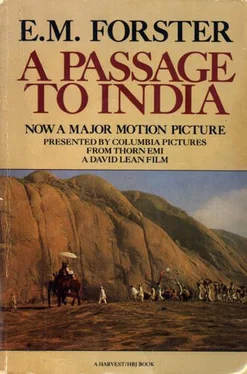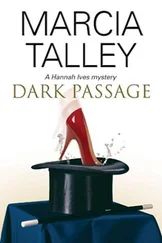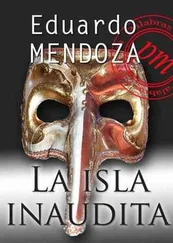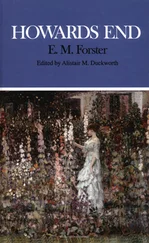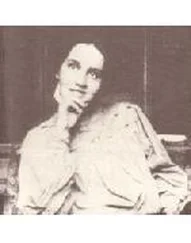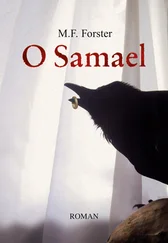Edward Forster - A Passage to India
Здесь есть возможность читать онлайн «Edward Forster - A Passage to India» весь текст электронной книги совершенно бесплатно (целиком полную версию без сокращений). В некоторых случаях можно слушать аудио, скачать через торрент в формате fb2 и присутствует краткое содержание. Город: San Diego, California, ISBN: , Издательство: Harcourt, Brace & World, Inc., Жанр: Классическая проза, на английском языке. Описание произведения, (предисловие) а так же отзывы посетителей доступны на портале библиотеки ЛибКат.
- Название:A Passage to India
- Автор:
- Издательство:Harcourt, Brace & World, Inc.
- Жанр:
- Год:неизвестен
- Город:San Diego, California
- ISBN:0-15-671142-7
- Рейтинг книги:5 / 5. Голосов: 1
-
Избранное:Добавить в избранное
- Отзывы:
-
Ваша оценка:
- 100
- 1
- 2
- 3
- 4
- 5
A Passage to India: краткое содержание, описание и аннотация
Предлагаем к чтению аннотацию, описание, краткое содержание или предисловие (зависит от того, что написал сам автор книги «A Passage to India»). Если вы не нашли необходимую информацию о книге — напишите в комментариях, мы постараемся отыскать её.
A Passage to India — читать онлайн бесплатно полную книгу (весь текст) целиком
Ниже представлен текст книги, разбитый по страницам. Система сохранения места последней прочитанной страницы, позволяет с удобством читать онлайн бесплатно книгу «A Passage to India», без необходимости каждый раз заново искать на чём Вы остановились. Поставьте закладку, и сможете в любой момент перейти на страницу, на которой закончили чтение.
Интервал:
Закладка:
"Of course she won't, she's a real sport."
"But, Mrs. Turton…"
"Yes, my dear child?"
"If I do break down, it is of no consequence. It would flatter in some trials, not in this. I put it to myself in the following way: I can really behave as I like, cry, be absurd, I am sure to get my verdict, unless Mr. Das is most frightfully unjust."
"You're bound to win," he said calmly, and did not remind her that there was bound to be an appeal. The Nawab Bahadur bad financed the defence, and would ruin himself sooner than let an "innocent Moslem perish," and other interests, less reputable, were in the background too. The case might go up from court to court, with consequences that no official could foresee. Under his very eyes, the temper of Chandrapore was altering. As his car turned out of the compound, there was a tap of silly anger on its paint—a pebble thrown by a child. Some larger stones were dropped near the mosque. In the Maidan, a squad of native police on motor cycles waited to escort them through the bazaars. The Collector was irritated and muttered, "McBryde's an old woman"; but Mrs. Turton said, "Really, after Mohurram a show of force will do no harm; it's ridiculous to pretend they don't hate us; do give up that farce." He replied in an odd, sad voice, "I don't hate them, I don't know why," and he didn't hate them; for if he did, he would have had to condemn his own career as a bad investment. He retained a contemptuous affection for the pawns he had moved about for so many years, they must be worth his pains. "After all, it's our women who make everything more difficult out here," was his inmost thought, as he caught sight of some obscenities upon a long blank wall, and beneath his chivalry to Miss Quested resentment lurked, waiting its day—perhaps there is a grain of resentment in all chivalry. Some students had gathered in front of the City Magistrate's Court—hysterical boys whom he would have faced if alone, but he told the driver to work round to the rear of the building. The students jeered, and Rafi (hiding behind a comrade that he might not be identified) called out the English were cowards.
They gained Ronny's private room, where a group of their own sort had collected. None were cowardly, all nervy, for queer reports kept coming in. The Sweepers had just struck, and half the commodes of Chandrapore remained desolate in consequence-only half, and Sweepers from the District, who felt less strongly about the innocence of Dr. Aziz, would arrive in the afternoon, and break the strike, but why should the grotesque incident occur? And a number of Mohammedan ladies had sworn to take no food until the prisoner was acquitted; their death would make little difference, indeed, being invisible, they seemed dead already, nevertheless it was disquieting. A new spirit seemed abroad, a rearrangement, which no one in the stern little band of whites could explain. There was a tendency to see Fielding at the back of it: the idea that he was weak and cranky had been dropped. They abused Fielding vigorously: he had been seen driving up with the two counsels, Amritrao and Mahmoud Ali; he encouraged the Boy Scout movement for seditious reasons; he received letters with foreign stamps on them, and was probably a Japanese spy. This morning's verdict would break the renegade, but he had done his country and the Empire incalculable disservice. While they denounced him, Miss Quested lay back with her hands on the arms of her chair and her eyes closed, reserving her strength. They noticed her after a time, and felt ashamed of making so much noise.
"Can we do nothing for you?" Miss Derek said.
"I don't think so, Nancy, and I seem able to do nothing for myself."
"But you're strictly forbidden to talk like that; you're wonderful."
"Yes, indeed," came the reverent chorus.
"My old Das is all right," said Ronny, starting a new subject in low tones.
"Not one of them's all right," contradicted Major Callendar.
" Das is, really."
"You mean he's more frightened of acquitting than convicting, because if he acquits he'll lose his job," said Lesley with a clever little laugh.
Ronny did mean that, but he cherished "illusions" about his own subordinates (following the finer traditions of his service here), and he liked to maintain that his old Das really did possess moral courage of the Public School brand. He pointed out that—from one point of view—it was good that an Indian was taking the case. Conviction was inevitable; so better let an Indian pronounce it, there would be less fuss in the long run. Interested in the argument, he let Adela become dim in his mind.
"In fact, you disapprove of the appeal I forwarded to Lady Mellanby," said Mrs. Turton with considerable heat. "Pray don't apologize, Mr. Heaslop; I am accustomed to being in the wrong."
"I didn't mean that…"
"All right. I said don't apologize."
"Those swine are always on the lookout for a grievance," said Lesley, to propitiate her.
"Swine, I should think so," the Major echoed. "And what's more, I'll tell you what. What's happened is a damn good thing really, barring of course its application to present company. It'll make them squeal and it's time they did squeal. I've put the fear of God into them at the hospital anyhow. You should see the grandson of our so-called leading loyalist." He tittered brutally as he described poor Nureddin's present appearance. "His beauty's gone, five upper teeth, two lower and a nostril… Old Panna Lal brought him the looking-glass yesterday and he blubbered… I laughed; I laughed, I tell you, and so would you; that used to be one of these buck niggers, I thought, now lie's all septic; damn him, blast his soul—er—I believe he was unspeakably immoral—er—" He subsided, nudged in the ribs, but added, "I wish I'd had the cutting up of my late assistant too; nothing's too bad for these people."
"At last some sense is being talked," Mrs. Turton cried, much to her husband's discomfort.
"That's what I say; I say there's not such a thing as cruelty after a thing like this."
"Exactly, and remember it afterwards, you men. You're weak, weak, weak. Why, they ought to crawl from here to the caves on their hands and kiiees whenever an Englishwoman's in sight, they oughtn't to be spoken to, they ought to be spat at, they ought to be ground into the dust, we've been far too kind with our Bridge Parties and the rest."
She paused. Profiting by her wrath, the heat had invaded her. She subsided into a lemon squash, and continued between the sips to murmur, "Weak, weak." And the process was repeated. The issues Miss Quested had raised were so much more important than she was herself that people inevitably forgot her.
Presently the case was called.
Their chairs preceded them into the Court, for it was important that they should look dignified. And when the chuprassies had made all ready, they filed into the ramshackly room with a condescending air, as if it was a booth at a fair. The Collector made a small officia' joke as he sat down, at which his entourage smiled, and the Indians, who could not hear what he said, felt that some new cruelty was afoot, otherwise the sahibs would not chuckle.
The Court was crowded and of course very hot, and the first person Adela noticed in it was the humblest of all who were present, a person who had no bearing officially upon the trial: the man who pulled the punkah. Almost naked, and splendidly formed, he sat on a raised platform near the back, in the middle of the central gangway, and he caught her attention as she came in, and he seemed to control the proceedings. Fle had the strength and beauty that sometimes come to flower in Indians of low birth. 'When that strange race nears the dust and is condemned as untouchable, then nature remembers the physical perfection that she accomplished elsewhere, and throws out a god—not many, but one here and there, to prove to society how little its categories impress her. This man would have been notable anywhere: among the thin-hammed, flat-chested mediocrities of Chandrapore he stood out as divine, yet lie was of the city, its garbage had nourished him, he would end on its rubbish heaps. Pulling the rope towards him, relaxing it rhythmically, sending swirls of air over others, receiving none himself, he seemed apart from human destinies, a male fate, a winnower of souls. Opposite him, also on a platform, sat the little assistant magistrate, cultivated, self-conscious, and conscientious. The punkah, wallah was none of these things: he scarcely knew that he existed and did not understand why the Court was fuller than usual, indeed he did not know that it was fuller than usual, didn't even know he worked a fan, though he thought he pulled a rope. Something in his aloofness impressed the girl from middle-class England, and rebuked the narrowness of her sufferings. In virtue of what had she collected this roomful of people together? Her particular brand of opinions, and the suburban Jehovah who sanctified them—by what right did they claim so much importance in the world, and assume the title of civilization? Mrs. Moore—she looked round, but Mrs. Moore was far away on the sea; it was the kind of question they might have discussed on the voyage out before the old lady had turned disagreeable and queer.
Читать дальшеИнтервал:
Закладка:
Похожие книги на «A Passage to India»
Представляем Вашему вниманию похожие книги на «A Passage to India» списком для выбора. Мы отобрали схожую по названию и смыслу литературу в надежде предоставить читателям больше вариантов отыскать новые, интересные, ещё непрочитанные произведения.
Обсуждение, отзывы о книге «A Passage to India» и просто собственные мнения читателей. Оставьте ваши комментарии, напишите, что Вы думаете о произведении, его смысле или главных героях. Укажите что конкретно понравилось, а что нет, и почему Вы так считаете.
